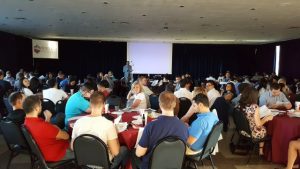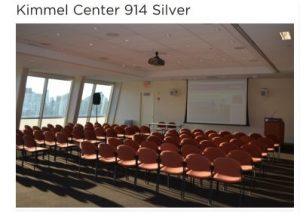
by ayman@gwu.edu | Jun 13, 2016 | ICSB 2016, ICSB Bulletin, The Latest

When we designed the ICSB Academy Program, our objective was to further enforce ICSB’s mission to facilitate learning related to entrepreneurship. We also wanted to inject enthusiasm, energy, and creativity in our conference by designing a program that was targeting younger participants — both as aspiring entrepreneurs and/or running diverse ventures. This is one of the fundamental pillars of ICSB.
With that in mind, we sought out a global faculty of experts in all domains with a passion to teach. We also needed a host university and some great partners to help with all the logistics. We are proud to say that the ICSB Academy vision and efforts are coming together with an electrifying opening kicked-off by our incoming ICSB President, Dr. Luca Iandoli.
Some quick facts to showcase ICSB 2017 Academy:
-
18 countries represented!
-
141 Students 🙂
-
Average Age of 2017 cohort is 26 years old.
We want to Thank Stevens Institute of Technology for opening their classrooms, campus, and dorms for our ICSB Academy Students. We also want to thank New Jersey Institute of Technology for supporting our Academy activities and hosting a lunch! Please see the full ICSB Academy Program at www.ICSBAcademy.org
You also have to download the ICSB App to see the pictures and posts from our Academy students! To download, click here: https://attendify.com/app/jfs7pc/
Tomorrow the ICSB Academy starts working on the Core Modules.
More to come..
by info@icsb.org | Jun 2, 2016 | The Latest
Tourism and Entrepreneurship: Partners in Development
Date: June 15th
Time: 9:30 a.m. to 12:00 noon.
Location: NYU, Kimmel Center 914
Address: 60 Washington Square S., New York, NY 10012

Tourism and entrepreneurship are not distinct concepts. Tourism has the potential to empower communities and the sustainable tourism agenda needs to focus on how to bring this about. Entrepreneurship is the ability to seek and identify opportunities and through tourists and tourism it can transform the local community.
Tourism is now one of the world’s largest and most dynamic industries and one of its fastest growing. For many countries tourism is seen as a main tool for development, as it stimulates new economic activities. Tourism may have a positive economic impact on the balance of payments, on employment, on gross income and production, but it may also have negative effects, particularly on the environment.
Unplanned and uncontrolled tourism growth can negatively impact the environment that tourist growth can be compromised. The environment, being the major source of tourist attraction, should therefore be protected in order to have further growth of tourism and economic development.
Topics Covered:
Entrepreneurship and Tourism
Eco-Tourism
Disruption in the Tourism Industry
Opportunities in the Tourism Industry
Feature Keynote Speaker

DR. KRISTIN M. LAMOUREUX
Associate Dean, Tisch Center for Hospitality and Tourism and Associate Clinical Professor of Tourism, New York University School of Professional Studies (USA)
A noted scholar, specializing in tourism and economic development, Dr. Lamoureux has been a distinguished and accomplished expert in professional and academic education for nearly 20 years. Most recently, she served as the executive director of the George Washington University (GW) International Institute of Tourism Studies (IITS) and as an assistant research professor of Tourism and Business Management in the GW School of Business. Under her leadership, IITS has grown to become a renowned tourism research center that plays a prominent role in tourism professional development, international development, curriculum development, and academic research.
by info@icsb.org | Jun 2, 2016 | The Latest
Workshop Title: Egypt & Entrepreneurship: Magnificent Past – Challenging Present – Exciting Future
Date: Friday, June 17th, 2016
Time: 3:45 p.m.
Location: Stevens Institute of Technology – Babbio Center
Authors Ahmed Osman, Ahmed Mohamed Shalaby and Ayman Ismail
Session Chair: Ahmed Osman (President of ICSB Egypt (MAKSABY)
Moderator: Hossam Saleh (MAKSABY)
Presenters: Ahmed Mohamed Shalaby, Ayman Ismail, and Amr Abu Elzam
Panelists: Amr Gohar, Hossam Maksood, and Pierre Girgis
Workshop Abstract:
The famous economist, Joseph Schumpeter (1883-1950), was among the first to lay out a clear concept of entrepreneurship. Schumpeter pointed out the many ways that entrepreneurs innovate. He called attention to the fact that not only do they innovate by figuring out how to use inventions, but they also innovate by inventing new means of production, new products, and new forms of organization. Entrepreneurs in other words, improve the productive capacity of society by generating the “creative destruction” of positive economic change.
Egypt in in the midst a new iteration of entrepreneurship. It is based on the idea that business innovation must be harnessed to fundamentally reinvent and redefine the meaning of compensated work. In the new economy business innovation is challenged to improve the human experience and preserve the planet that supports it.
This workshop and subsequent conference in Egypt in November 2016 focuses on the intersections between innovation, opportunity recognition, and sustainability. Egypt version of entrepreneurship is a youth driven effort to create viable “work opportunities” in an economy now distant from its agricultural and industrial forerunners.
Special Thanks:
by info@icsb.org | May 30, 2016 | Conferences, ICSB 2016, The Latest
In September of 2015, the United Nations adopted seventeen Sustainable Development Goals (SDGs). The SDGs aim to ensure that global development in the next 15 years is socially, economically, and environmentally sustainable. These goals were unanimously adopted by the UN’s 193 member states.
While entrepreneurship has a role to play in many of the goals, it has a particular impact on Goal 8: “Promote inclusive and sustainable economic growth, employment and decent work for all.”
Goal 8 Facts
- Global unemployment increased by nearly 19% between 2007 and 2012, from 170 million to nearly 202 million. 75 million of the unemployed are young people.
- Nearly 2.2 billion people live on less than $2 a day.
- Businesses and governments will need to create 470 million jobs for new entrants into the job market by 2030.
Goal 8 Targets
Goal 8 has an aggressive target of achieving full global employment by 2030. In the nearer term, Goal 8 aims to “reduce the proportion of youth not in employment, education or training” by 2020. Another target for goal 8 is to promote entrepreneurship and innovation “and encourage the formalization and growth of micro-, small- and medium-sized enterprises, including through access to financial services.”
How do SMEs affect Goal 8?
If the UN is to come close to achieving the objectives laid out in its Sustainable Development Goals, it will need help from the private sector. According to the World Bank:
Formal SMEs contribute up to 45 percent of total employment and up to 33 percent of national income (GDP) in emerging economies. These numbers are significantly higher when informal SMEs are included.
SMEs will be a critical factor in whether the world can attain full employment by 2030.
ICSB 2016 at the UN
ICSB 2016 gets its start at United Nations headquarters on Thursday, June 16. Our first conference session will address the role of SMEs in helping the world achieve the UN SDGs, including Goal 8.
ICSB 2016 invites you to join us at the UN and at our subsequent sessions and events at the Stevens Institute of Technology. Register today to secure your seat at the conference.
by info@icsb.org | May 27, 2016 | The Latest
Before this year’s conference kicks off, the ICSB will be holding a pre-conference policy forum on June 15 from 12:30 pm to 5:00 pm at NYU’s Kimmel Center.
This year’s policy forum will address two questions: what small business policy changes have occurred in different countries, and how can we best measure SMEs?
Global Policy and Regulatory Update
Dr. Michael Schaper will give a presentation on policy, legislative, legal and regulatory developments pertinent to small business that have occurred over the last year. The presentation will include key developments from several countries around the world.
SME & Entrepreneurship Indices
Subsequent sessions will discuss the measurement of SMEs.
Developing SME & Entrepreneurship Indices: What Are The Big Issues
Dr. Donna J. Kelley will talk about the major indices that have been developed to date, and what their strengths and weaknesses have been.
Indices In Action: Some Examples
After a break for tea and networking, Dr. Giuseppe Zollo, Dr. Kelly G. Shaver, and Dr. Hugo Kantis will talk about what their data sets cover, how they can be used by policymakers, and their advantages and limitations
A Policymaker’s Perspective
Finally, Brian Headd of the US Small Business Association and Hon Craig Foss MP, Minister for Small Business and Statistics in New Zealand will discuss their experiences in using databases, comparative ranking systems, and what changes they’d like to see in the future.
Register for the Public Policy Forum
Registration for the pre-conference public policy forum is only $75. If you’re interested in attending the forum, register today.
by info@icsb.org | May 26, 2016 | ICSB 2016, The Latest
You probably know about the annual ICSB World Conference, which features a long list of distinguished international speakers, as well as opportunities for professional development and networking among nearly 1,000 international delegates.
But how much do you know about the ICSB?
It wasn’t always international.
The ICSB was founded in 1956 as the National Council for Small Business Management Development (NCSBMD). It was formed to foster entrepreneurship in the United States on the belief that small businesses were essential to the national economy, and that those small businesses needed management education to succeed and thrive.
ICSB goes global.
In 1977, the Council decided to expand to include the international small business community, and changed its name to the International Council for Small Business. As the world’s economy expanded over the next decade, the ICSB’s membership nearly doubled. ICSB now has affiliate chapters on every continent.
ICSB on a mission.
The ICSB is devoted to continuing management education for entrepreneurs and small business.
Mission Statement
The International Council for Small Business is devoted to the advancement of management development practices for potential entrepreneurs and existing small business owner/managers through education, research, and the free exchange of ideas.
Council members representing education, industry, financial institutions and government, provide a worldwide network of ideas and experience exchange on management assistance for small business.
By filling the role of an umbrella organization, as an integrator of new knowledge, the Council reinforces rather than duplicates the work of other organizations involved in small business development. For this reason, we encourage the development of national and associate affiliates of the Council so we can continue to build the information-exchange network in many countries.
ICSB 2016
Each year, the ICSB hosts an international conference. This year, the ICSB World Conference will take place at multiple locations in New York and New Jersey, including United Nations headquarters and the Stevens Institute of Technology. ICSB 2016 will focus on the role of entrepreneurship and innovation in advancing the UN New Sustainable Development Goals.
For more information about the conference, or to secure your seat, please click here or visit the ICSB’s website at http://ICSB.org/.





